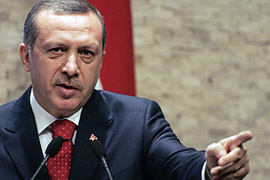Turkey reviews ruling party ban
The AK party is accused of trying to scrap secular principles in the constitution.

An assessment of the 162-page indictment was sent to the judges last week, suggesting that the court hear the case but asking the prosecutor’s office to provide more evidence.
The court closed two political parties deemed to be anti-secular in 1998 and 2001.
Yalcinkaya asked the court that 71 people, including Erdogan and Abdullah Gul, the president, be barred from politics for five years.
The Justice and Development party has 330 seats in the 550-seat parliament, and its members could regroup under the banner of a new party to lead the government if the governing party is shut down.
The government has criticised the prosecutor’s move as being anti-democratic. One ruling party official said it was planning a constitutional amendment making it harder to ban political parties.
Uncertainty
Ilnur Cevik, a columnist with the New Anatolian newspaper, said Turkey will enter six months or more of uncertainty while it is established whether or not the party will be closed down.
 |
| Erdogan is working to get Turkey into the European Union [Reuters] |
“Some say it is a foregone conclusion,” he told Al Jazeera.
“Some say this is a political and not a legal case aimed directly at AK party. Thus, in the next six months to one year we will be agonised to see what will happen to Turkey.
“Our stock market is down, the dollar is high and euro has climbed against the Turkish lire. A lot of people are concerned that the hard-earned stability of Turkey is in jeopardy.”
He also said that many Turks feel that the party was voted in by the people and it should not be the decision of 11 judges to remove them.
“Parties are elected into parliament by the people and should be brought down by the people if they are unhappy,” he said.
EU concern
The European Union, which Turkey hopes to become a member of, also criticised the case.
Olli Rehn, the EU enlargement commissioner, said he was concerned about the action, suggesting the issue could have ramifications for Turkey‘s bid to join the union.
“In a normal European democracy this kind of political issue should be debated in parliament and decided in the ballot room, not in court,” he said.
Turkey’s EU campaign, which is expected to last many years, has already been damaged by French and German misgivings, a dispute over the divided island of Cyprus, freedom of speech issues and divisions within the predominantly Muslim nation that have reduced domestic support for accession.